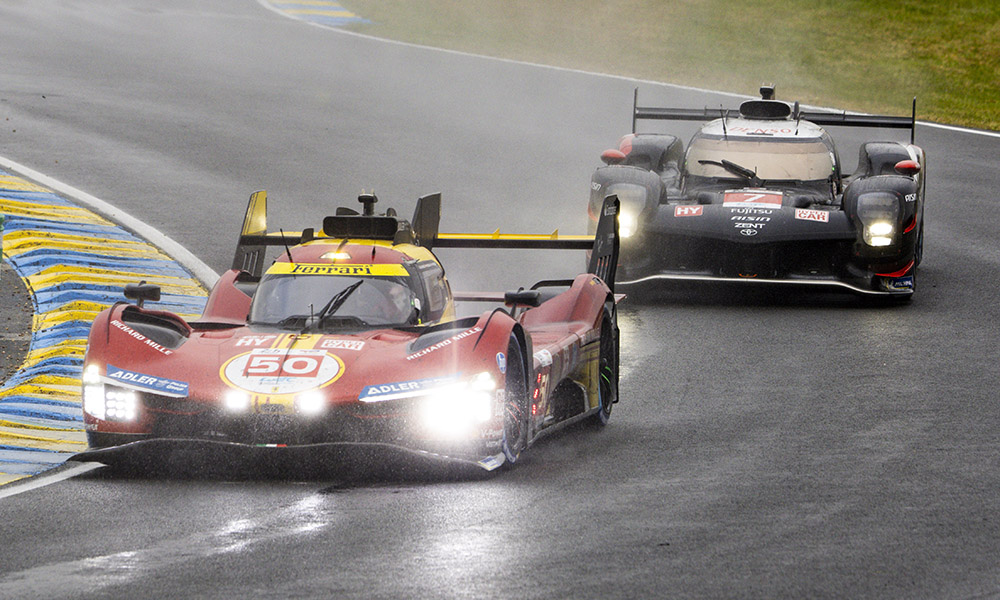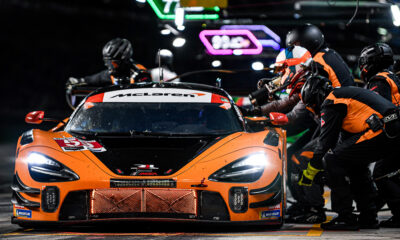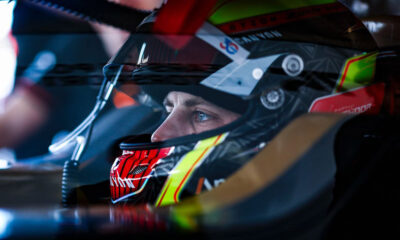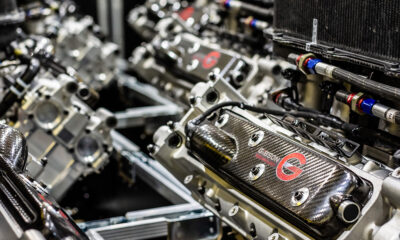
Photo: Julien Delfosse/DPPI
Lessons from Imola about handling changing conditions were a “big help” in Ferrari’s 24 Hours of Le Mans win, believes the marque’s global head of endurance Antonello Coletta.
Ferrari overcame stiff opposition from Toyota, Porsche and Cadillac to score back-to-back wins in the FIA World Endurance Championship blue riband, as the No. 50 car shared by Nicklas Nielsen, Antonio Fuoco and Miguel Molina clinched victory.
It came after a rain-soaked race which featured near-constantly changing conditions and multiple safety car periods that closed up the Hypercar pack and kept four manufacturers in contention for the victory until the closing stages.
Ferrari often had its cars on differing tire strategies throughout the race, including the No. 83 satellite AF Corse entry that dropped out in the closing stages with an apparent hybrid system problem.
Coletta believes the outcome at Le Mans shows that the Prancing Horse learned from the Imola round of the WEC in April, when it showed a clear pace advantage only to lose a near-certain victory by leaving its factory 499Ps out on slicks on a wet track.
“At Imola, we had a misunderstanding between the team and our drivers and we lost the race,” Coletta said when asked about Sportscar365 about the significance of Imola in Ferrari’s 11th overall triumph at La Sarthe.
“I remember I organized a lot of meetings with the mechanics and engineers after Imola. I spoke with them because I wanted to understand the problem and why we had it.
“Now I believe we demonstrated we worked very well. I think all the choices we took in this race have been correct. There were no misunderstandings. Probably the Imola race was a big help for these 24 Hours.
“I am very happy with the answer of the team after the ‘Italian GP’ which, frankly speaking, was a disaster to lose in front of our fans.”
Ferrari suffered a late scare when the door on the No. 50 car worked lose during Nielsen’s penultimate stint and had to be fixed at the Danish driver’s penultimate pitstop.
The Maranello squad had to contend with similar late pit stop drama on its way to victory last year with Alessandro Pier Guidi having to perform a power cycle on the No. 51 car twice in the closing stages.
Coletta joked “probably each year we will find another problem in the last stint!” but said that the situation was not as grave as the one Pier Guidi had to contend with in 2023.
“Without the problem with the door probably we would have won by a larger margin,” he added “We lost more or less 20, 25 seconds because we had to anticipate the stop.”
Victory Exceeds Ferrari’s Pre-Race Podium Target
Reflecting on Ferrari’s 11th victory at Le Mans, Coletta said he had believed the final outcome to have been “impossible” based on the outcome of Sunday’s test day, which was topped convicningly by pre-race favorite Porsche.
However, the Italian added that he started to believe a victory was possible once the 499Ps began surging to the front of the field early in the race, admitting its strategy during that phase was to push hard to gauge the real competitiveness of its rivals.
“My idea was that, without a special race, without changing weather or other problems, it would be impossible for us to win,” said Coletta. “[I thought] the best [result possible] should be to be on the podium.
“During the race, I changed my idea because I understood the situation was not bad.
“Our strategy was to start from the first three, four hours with maximum attack to understand the real value of our car and our other competitors. And then the weather made things change.
“When there was a lot of rain, we were competitive, but in less rain, we were not, and we lost positions. This was the real problem of these 24 Hours.
“Without the rain, our competitiveness has been very strong. But during the race it’s difficult to think, ‘Ok, we can win the race’… the maximum you can think is that you have a chance to win.
“The 24 Hours finishes on the final lap and in any race I wait for the final lap.”


























